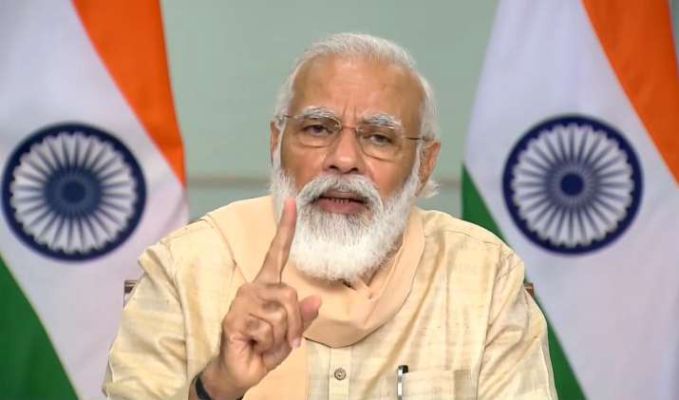
New Delhi: Prime Minister Narendra Modi on Thursday launched ”Transparent Taxation-Honoring the Honest’ platform, the next phase of direct tax reforms aimed at easing compliance and rewarding honest taxpayers, as the government looks to rebuild the pandemic-hit economy.
While launching the platform PM Modi said, “This platform has big reforms such as faceless assessment, faceless appeal, and taxpayers charter. Faceless assessment and taxpayer’s charter come in force from today, whereas faceless appeal service will be available from September 25.”
In the Union Budget 2019, the Finance Minister proposed the introduction of a scheme of faceless e-assessment. The scheme seeks to eliminate the human interface between the taxpayer and the income tax department. The scheme lays down the procedure to carry out a faceless assessment through electronic mode.
Moreover, FM Nirmala Sitharaman has introduced faceless tax appeals against tax orders on lines of faceless assessment. All the documents of the assesse will be scrutinized electronically by the officials in case of default, reducing powers of the authorities to arrest and freeze accounts.
According to Finance experts, “The concept behind the amendment is not focused on identifying the person who has committed the offence but rather identifying the loophole that is being used for fraud or evasion of taxes. Thereafter once the loophole is blocked, and then the process of litigation can carry on with the offender at its own pace.”
Further, Taxpayer Charter is a statutory status and empowerment for the taxpayers given by the Government of India to avoid harassment of Taxpayer and ease in the policies of Tax payments.
In the US, “Taxpayer Charter explains what you can expect from us and what is expected from you.” The aim of the Charter is that of nurturing the relationship between the Revenue departments and the community that they serve, a relationship of mutual trust and respect.
In his speech, PM Modi said, “The emphasis is on making every rule-law, policy people-centric and public friendly. This is the use of the new governance model and the country is getting its results.”
“There was a time when there used to be a lot of talk about reforms. Sometimes decisions were taken out of compulsion or pressure and called reforms. So, the desired results could not be achieved. Now this thinking and approach have changed,” the PM stated.
“From power-centric to people-centric and public friendly approach – every rule, law and policy is taken out of the process. This is the use of the new governance model of new India and the country is getting happy results as well.”
“The taxpayer will now be given the respect they deserve. The taxpayer will now be trusted, not looked at with doubt. The (tax) department will have to carry out the steps and processes in a time-bound manner,” PM Modi added.
Asking people to pay taxes due to them, Modi said while it is the responsibility of tax officers to deal with taxpayers with dignity, people should also consider paying taxes as their responsibility.
Fundamental reforms were needed in Indian tax system, he said, adding India is among the nations with lowest corporate tax rates.
The Budget for fiscal 2021 had announced a “taxpayer charter”, which is expected to have statutory status and will empower citizens by ensuring time-bound services by the Income Tax Department. This has come into effect now.
According to a release by the Prime Minister’s Office (PMO), the Central Board of Direct Taxes (CBDT) has carried out several major tax reforms and indirect taxes in recent years.
Last year, the corporate tax rates were reduced from 30 per cent to 22 per cent and for new manufacturing units, the rates were reduced to 15 per cent. The government has also done away with the Dividend distribution Tax and the focus of the tax reforms has been on reduction in tax rates and on simplification of direct tax laws.
Finance Minister Nirmala Sitharaman, who was also present during the launch, said, “PM’s vision is to empower the taxpayer, to provide a transparent system and to honour honest taxpayers. To realise this vision, CBDT has given a framework and put in place this system.”
The virtual event was witnessed by various chambers of commerce, trade associations, chartered accountants’ associations, and “eminent” taxpayers. Minister of State for Finance and Corporate Affairs Anurag Singh Thakur was also present during the launch.
In 16 years between 2002-03 and 2018-19, the number of individuals who filed tax returns grew 62%, but the number of people who paid income tax rose by only 22%. The government’s attempt to bring more people into the tax administration’s net has been successful, but a rising percentage of those filing returns are able to prove they have no taxable income.
In 2002-03, no. of tax returns was 3.4 crore, no. of taxpayers was 2.7 crore and those who filed returns paid tax was about 80%. In 2002-03, 4.4% of Indians aged 20 and more paid income tax, in 2018-19 this reduced to 3.8%.
In 2018-19, the number of tax returns was 5.5 crore, no. of taxpayers was 3.3 crore and those who filed returns paid tax was 60%. Percentage of population filing tax returns went up from 3.2 in 2002-03 to 4.18 in 2018-19.
PM Modi, while speaking at the launch also said that only 1.5 crore people pay income tax in a country with 130 crore population. “Those who are able to pay tax, but they are not in the tax net yet, they should come forward with self-motivation, this is my request and hope,” he added.
(Aditya Hore)












